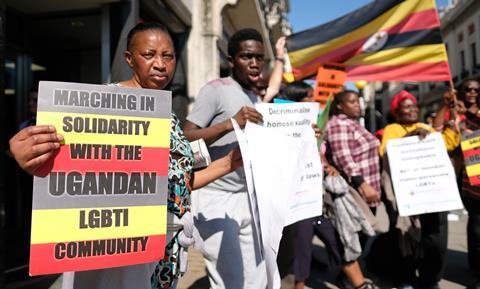Ugandan MPs have recently passed a bill that could result in life imprisonment, or even the death penalty, for homosexual acts. Here’s why all Christians should fight against it, regardless of their views on same-sex relationships

Criminalisation of same-sex activity, and therefore of LGBT people around the world, is very real.
According to the Human Dignity Trust, there are 71 jurisdictions around the world that treat consensual same-sex activity as crimes, including several in which the penalty for it is death.
It therefore seems timely to set out why at Living Out we are opposed to criminalisation, even though we believe that scripture teaches that God’s good gift of sexual intimacy belongs only in the context of marriage between a woman and a man.
In this short opinion piece, I would like to focus on four reasons:
1. LGBT people, like all of us, should be treated with dignity and respect
LGBT people are made by God in his image and are precious to him. They should be treated accordingly. In John 4:1-42, we read about Jesus’s conversation with a woman who was living with a man to whom she was not married (v18). While Jesus does gently challenge her about this, what is remarkable and beautiful about their conversation is the respect with which Jesus, a Jewish man, treats her, a Samaritan woman.
It is unjust to treat one form of consensual sexual activity more severely than another
Far from treating her as a criminal, he makes himself vulnerable to her by asking for a drink of water and taking her theological questions and thinking seriously. As a result of their conversation, ”many more became believers” (v41).
Treating people with dignity and respect is the way to lead people to faith and obedience to Jesus. Treating people as criminals is far more likely to drive them away.
2. Jesus saved someone who had committed sexual sin from brutal punishment
In John 8:1-11, we read about Jesus’s meeting with a woman who had been caught in the act of committing adultery. The penalty for this under the law of the Hebrew Bible was death by stoning (v5). Some of the religious leaders try to catch Jesus out by seeing whether he will really uphold the law (v6). But, as we’ll see in a moment, Jesus challenges them in such a way that they go away without harming her. He then reassures her that "neither do I condemn you” (v11).
Just as with the woman at the well, Jesus does not ignore or endorse the fact she sinned; he famously tells her to “Go now and leave your life of sin.” But even this challenge is in the context of his rescue and reassurance of her.
Elsewhere in his teaching, Jesus is actually stricter about sexual morality than the law of the Hebrew Bible (eg Matthew 5:27-28; 31-32). But he did not apply the penalties of the law to those who had committed sexual sin. Indeed, quite the reverse: on the cross, he bore the penalties of the law upon himself.
Following the example of Jesus therefore means standing against the criminalisation of sexual sin, rather than supporting it.
3. Criminalising same-sex activity but not other forms of sexual immorality is unjust
Of course, there are actions that should be treated as crimes, including sexual crimes such as rape. But (not least because of the example of Jesus in John 8) we do not and should not treat consensual sexual sins such as premarital sex or adultery as crimes. While they are sinful and harmful in various ways, we recognise that God has given us scope to make our own choices and, ultimately, it is God who holds us all to account for our deeds. The law cannot control all behaviour or enforce moral standards.
Consensual same-sex activity is no more sinful or harmful than consensual sexual activity outside marriage between two people of the opposite sex. We may not approve of it, but it is unjust to treat one form of consensual sexual activity more severely than another, simply because it is between people of the same sex.
4. We are all sexual sinners, and are not entitled to condemn others
In the episode just mentioned in John 8, the way that Jesus persuaded the religious leaders not to harm the woman was by confronting them with the fact that they, too, were sinners: “Let any one of you who is without sin be the first to throw a stone at her” (John 8:7). Elsewhere, Jesus teaches us to "do to others what you would have them do to you” (Matthew 7:12).
Jesus is stricter about sexual morality than the law. But he did not apply the penalties of the law to those who had committed sexual sin
The point is, we are all sexual sinners. We all deserve to be in the same place as the woman caught in adultery. How then could we presume to punish those who have committed sexual sin, when we deserve to be punished ourselves?
What can we do?
What might we do in the light of this? Most of us won’t be in a position to influence church leaders, let alone legislators, in the places in which same-sex activity is currently criminalised. But we can consider doing three things:
- Pray for LGBT people around the world who frequently experience mistreatment and abuse as well as criminalisation.
- Consider supporting efforts to de-criminalise same-sex activity around the world.
- Ensure you are equipped to offer unconditional compassionate support to LGBT people in your own community and networks.
This article was first published on the Living Out website in response to news that the Anglican Church in Ghana were supporting a parliamentary bill that would strengthen harsh criminal sentences in Ghana for same-sex sexual activity. Read the full article in its original context here




































1 Reader's comment